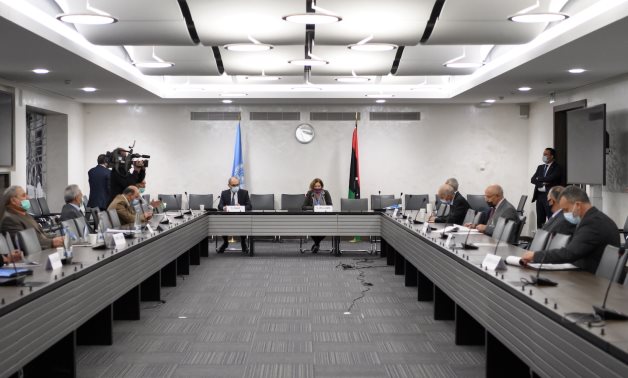
A general view of the talks between the rival factions in the Libya conflict at the United Nations offices in Geneva, Switzerland October 20, 2020 . Fabrice Coffrini/Pool via REUTERS
CAIRO -2 December 2020: On Tuesday, representatives of the warring parties in the Libyan crisis resumed negotiations to reach an agreement on a national unity government that will run a preparatory phase before the general elections are held at the end of 2021.
Spokesman for the United Nations Support Mission in Libya, Jean Allam, told Al-Arabiya TV that the talks discussed the proposals of the members of the political dialogue forum to get out of the current impasse.
He added, "We hope there will be agreement on mechanisms for selecting the executive authority to move forward in implementing the road map that was agreed upon in Tunisia."
It is noteworthy the Libyan talks are taking place virtually via video conference, managed by the United Nations Support Mission in Libya from its headquarters in the Buhaira region near the center of the Tunisian capital.
This is the third meeting of the second round of the Libyan dialogue. In November, the United Nations conducted a round of direct negotiations in Tunis.
The direct meetings and video conferences failed to resolve the differences over the selection of the members of the transitional authority that the executive authority requires the international community to install before the beginning of 2021, in implementation of the recent UN Security Council resolution on Libya and as an embodiment of the UN Security Council resolution on Libya and the results of the Berlin conference.
According to reliable sources, Williams intends to conduct a recent round of negotiations in Geneva in mid-December.
The US diplomacy, which led several months ago international mediation to cease the struggle for power and wealth in Libya, is not optimistic, unlike what was the case with the start of the Libyan political dialogue rounds in Tunisia last November.
No expectations of a breakthrough
For his part, a source close to the negotiations said: "We do not expect a breakthrough, and the UN envoy is aware, as we note as observers, that the spoilers want to drag the negotiations until the end of Williams' contract with the United Nations on December 18."
Also, the Libyan negotiators accuse a group of members of the House of Representatives of obstructing any agreement to serve personal interests and wasting time by extending negotiations until Williams leaves. The objectors hope that the new UN envoy will reconfigure the political dialogue committees, so that they are divided between representatives of Parliament and the Supreme Council of State only, and that the negotiation delegates will be chosen by voting in both councils.
Observers believe the background of this position is due to Williams' warning more than once in closed sessions that the government that will be formed per the Security Council resolution could start its work by recommending dialogue committees if the House of Representatives obstructed granting it confidence.
On November 12, Williams said, "Libya’s warring sides will immediately reopen the main coastal road connecting the vast country’s east and west across front lines," as part of a ceasefire deal agreed in October, adding the two sides would immediately begin work to reopen the road, removing landmines and withdrawing fighters from the area.
As laid out in the Geneva ceasefire agreement, foreign fighters and mercenaries are to be transferred to Tripoli or Benghazi before departing Libya by Jan. 23.
The implementation of the ceasefire is happening alongside political talks taking place in Tunis, where 75 delegates chosen by the United Nations on Wednesday agreed to hold elections within 18 months.
Oil-rich Libya has been mired in chaos since the ouster and killing of Muammar Gaddafi in 2011. It now has two rival authorities and a multitude of militias vying for control of the country.
The country’s internationally recognized government is based in Tripoli, while Khalifa Haftar, the commander of the Libyan National Army, is supported by a parallel administration based in the east.
Comments
Leave a Comment